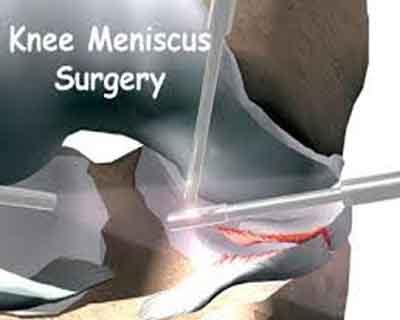- Home
- Editorial
- News
- Practice Guidelines
- Anesthesiology Guidelines
- Cancer Guidelines
- Cardiac Sciences Guidelines
- Critical Care Guidelines
- Dentistry Guidelines
- Dermatology Guidelines
- Diabetes and Endo Guidelines
- Diagnostics Guidelines
- ENT Guidelines
- Featured Practice Guidelines
- Gastroenterology Guidelines
- Geriatrics Guidelines
- Medicine Guidelines
- Nephrology Guidelines
- Neurosciences Guidelines
- Obs and Gynae Guidelines
- Ophthalmology Guidelines
- Orthopaedics Guidelines
- Paediatrics Guidelines
- Psychiatry Guidelines
- Pulmonology Guidelines
- Radiology Guidelines
- Surgery Guidelines
- Urology Guidelines
Most surgical meniscus repairs are unnecessary

Three out of four people could avoid knee surgery with a new form of exercise therapy, with significant cost savings for society.
Injury to the menisci, the cartilaginous discs within the knee joint, can be painful when running, and can cause the knee to give way or ‘lock’.
Such injuries are troublesome and sometimes painful, and can prevent you from exercising or attending work.
A new study shows that exercise therapy is just as effective for treating meniscus injuries as surgery.
PhD candidate and orthopaedic surgeon Nina Jullum Kise is in charge of the study. She is a senior consultant at the Department of Orthopaedic Surgery, Martina Hansen’s Hospital in Bærum.
No difference between surgery and exercise
A total of 140 patients with meniscus injuries in Norway and Denmark took part in the study.
They drew lots for treatment with either exercise or surgery.
Nina Jullum Kise says:
Two years later, both groups of patients had fewer symptoms and improved functioning. There was no difference between the two groups.
However, those who had exercised had developed greater muscular strength. This is consistent with previous research, which showed that surgery yielded no additional benefits for patients who had had exercise therapy.
The current study is the first to compare cases where the patient had only exercise therapy or only surgery.
Big savings
Jullum Kise believes that as many as three in four could be spared surgery with the right exercise therapy programme.
In 2015 almost 11 000 people in Norway underwent arthroscopic meniscus repair, a form of keyhole surgery.
However, the general trend is to place more patients on exercise therapy programmes and hold off on surgery.
A single meniscus operation is estimated to cost taxpayers in excess of 16 000 Norwegian kroner.
And then there’s absence from work on top of that.
Although exercise therapy also has costs, these are lower than for surgery.
Reducing the number of surgical meniscus repairs would thus lead to significant savings for society.
Training with physiotherapist
In the study, the patients attended training sessions with a physiotherapist 2–3 times a week for 12 weeks.
The exercise therapy programme involves a warm up and various types of strength training. It is built up in stages that become more challenging as the patient improves and becomes stronger,” explains Dr Jullum Kise.
Each patient receives a personalized training programme, and learns to do the exercises under the supervision of a physiotherapist. Once they have learned the exercises, they train on their own but attend weekly sessions with the physiotherapist for adjustments and to be given new exercises.
May counteract osteoarthritis
Menisci are crescent-shaped discs of cartilage on both sides of the knee joint. The meniscus is a shock absorber that distributes weight across the joint and at the same time stabilizes the joint when you walk or run.
“We hope that the stronger muscles of the exercise therapy group may counteract osteoarthritis, a type of arthritis that often occurs in patients who have undergone surgery for a meniscus injury,” says Dr Jullum Kise.
In principle there are two different types of meniscus injury.
- Acute injuries, which often occur in younger people who might, for example, twist a knee during downhill skiing.
- Wear and tear (degenerative) injuries, which are the first sign that the joint is beginning to break down, so-called osteoarthritis.
Young people with acute injuries should undergo surgery. That way, the meniscus can continue to protect the cartilage in the joint. Damage due to wear and tear cannot be repaired surgically, but the joint can be cleared of worn tissue that would otherwise cause the knee to lock or to give way.
Danish-Norwegian collaboration
The study is a Danish-Norwegian collaboration and was designed and initiated by:
- Professor Ewa Roos, at the University of Southern Denmark
- Professor May Arna Risberg, at the Norwegian School of Sport Sciences and NAR, Norwegian Research Center for Active Rehabilitation
- Professor Lars Engebretsen, at the University of Oslo and orthopaedic surgeon at Oslo University Hospital
- Dr Silje Stensrud, physiotherapist, who used data from the first three months of the study to complete her PhD thesis.
The exercise therapy programme in the study was developed by Stensrud, Risberg and Roos, in collaboration with physiotherapists at the Norwegian Institute of Sports Medicine (NIMI).
You can read the full article by clicking on the following link :
Nina Jullum Kise, May Arna Risberg, Silje Stensrud, Jonas Ranstam, Lars Engebretsen, Ewa M Roos. Exercise therapy versus arthroscopic partial meniscectomy for degenerative meniscal tear in middle aged patients: randomised controlled trial with two year follow-up. BMJ, 2016; i3740 DOI: 10.1136/bmj.i3740

Disclaimer: This site is primarily intended for healthcare professionals. Any content/information on this website does not replace the advice of medical and/or health professionals and should not be construed as medical/diagnostic advice/endorsement or prescription. Use of this site is subject to our terms of use, privacy policy, advertisement policy. © 2020 Minerva Medical Treatment Pvt Ltd